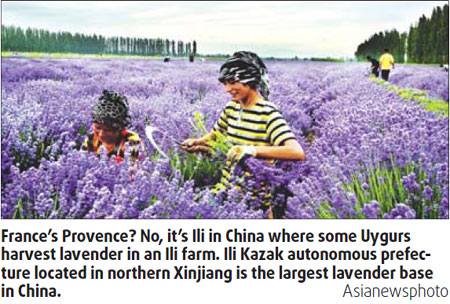


Though France's Provence is known for its food, wine and lush lavender fields it's not the only purple paradise on earth. When it comes to the fragrant flowers it has a rival in Ili Kazak autonomous prefecture in China's Xinjiang Uygur autonomous region.
Ili Kazak, located in northern Xinjiang, is the largest lavender base in China as its climate and humidity are an ideal area for lavender cultivation.
The lavender fields in Ili have become a unique travel destination attracting travelers all across the globe and to the bustling Xinjiang International Grand Bazaar, in the capital of Urumqi, tourists from all over the world pick an array of lavender products in addition to souvenirs such as carpets, traditional hats, jewelry and knives.
A visitor from Beijing said: "I always bought lavender products from France, but now I don't need to go that far and pay so much money."
She said that the quality of Xinjiang's lavender is comparable with lavender from Provence.
A total of 220,000 mu (one acre equals 6.07 mu) of lavender was planted in 2008 and it accounts for over 95 percent of the country's total amount. Every year, about 100,000 tons of lavender oil is produced in the region and hundreds of lavender products have been sold overseas.
Every April 400 farmers from Sangong township of Huocheng county start planting lavender, like many other lavender bases at Ili Kazak autonomous prefecture.
Selipu is one of the 400 farmers from Sangong township in Huocheng county and last year he was exhausted after his family signed contracts for about 14 mu of land to grow more.
But Selipu was also pretty delighted, saying that in 2005, he grew 6 mu of lavender and made more than 2,000 yuan per mu since 2007. "I grew 8 mu more in 2008 and it will be a great profit," he said.
In Sangong township, over 80 farmers have turned over 1,000 mu of wilderness into lavender plantations. Li Shudong, official of Sangong township, said the lavender industry not only has increased local farmers' incomes, but also brought great ecological benefits.
In the past, China used lavender for household and personal care chemicals but depended solely on imports. The country previously tried to grow lavender in Hebei, Shaanxi, Qinghai provinces and some other regions but had failed.
In 1964, the central government asked the Fourth Agricultural Division of Xinjiang Production and Construction Corps (XPCC) to carry out a trial for lavender growing in Ili. They imported 60 lavender seeds and grew them on less then ten sq m of land.
Because Ili and Provence are both located at nearly the same latitude and also share similar climatic and soil conditions the trial succeeded in 1971 when they produced 15 kg of lavender oil. In 1988, the lavender growing area reached 5,000 mu.
In 1990s the XPCC gradually created brands, such as Yuanxin, Ziyu, Xinjiang and promoted them domestically and internationally.
In 2001 it was a major turning point for Xinjiang's lavender industry when then vice-president Hu Jintao became interested in the purple rain of capital that the area was growing.
He said: "Lavender development should be encouraged and the local competitive brands should be further promoted."
In 2003 experts of XPCC began to intensively improve the varieties of lavender. In 2004, they selected 100 grams of lavender seeds for breeding and two years later the lavender they grew had stronger fragrance and output of oil dramatically improved.
In 2005, the XPCC decided to integrate the lavender industry to create uniform plantations, processing methods, prices and brands. They also built research and development bases and invested 5 million yuan in setting up the Xinjiang Ili Yi Paer Khan Spices Development Co Ltd.
The company focused on developing lavender products and since 2006, the company has invested millions of yuan in product development.
In cooperation with leading household and personal care chemical companies in Shanghai, Guangzhou, Shaanxi and Tianjin, they introduced 128 kinds of products, including cosmetics, aromatherapy, health care and decorative items. Over 200 franchise stores have opened in Beijing, Shanghai and many other places.
Chen Caihua, a manager from Yi Paer Khan, said currently they're actively expanding in the international market.
(China Daily 02/09/2009 page10)













